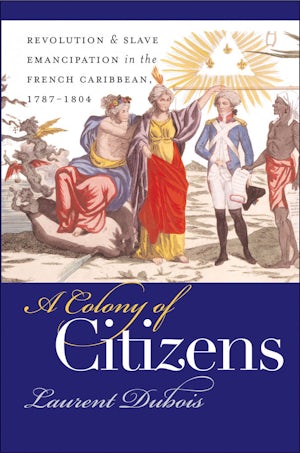A Colony of Citizens
Revolution and Slave Emancipation in the French Caribbean, 1787-1804
By Laurent Dubois
472 pp., 6.125 x 9.25, 24 illus., 4 maps, notes, index
Not for Sale in the Caribbean
-
Paperback ISBN: 978-0-8078-5536-2
Published: March 2004 -
E-book EPUB ISBN: 978-0-8078-3902-7
Published: December 2012 -
E-book PDF ISBN: 979-8-8908-7654-6
Published: December 2012
Published by the Omohundro Institute of Early American History and Culture and the University of North Carolina Press
Buy this Book
- Paperback $47.50
- E-Book $29.99
Published by the Omohundro Institute of Early American History and Culture and the University of North Carolina Press
Awards & distinctions
2005 Frederick Douglass Book Prize, Gilder Lehrman Center for the Study of Slavery, Resistance, and Abolition
2004 John Edwin Fagg Prize, American Historical Association
2004 Prize in Atlantic History, American Historical Association
2005 David Pinkney Prize, Society for French Historical Studies
But French administrators on the island combined emancipation with new forms of coercion and racial exclusion, even as newly freed slaves struggled for a fuller freedom. In 1802, the experiment in emancipation was reversed and slavery was brutally reestablished, though rebels in Saint-Domingue avoided the same fate by defeating the French and creating an independent Haiti.
The political culture of republicanism, Dubois argues, was transformed through this transcultural and transatlantic struggle for liberty and citizenship. The slaves-turned-citizens of the French Caribbean expanded the political possibilities of the Enlightenment by giving new and radical content to the idea of universal rights.
About the Author
Laurent Dubois is professor of history and Romance studies at Duke University. He is author of Les esclaves de la République: l'histoire oubliée de la première émancipation, 1789-1794.
For more information about Laurent Dubois, visit
the
Author
Page.
Reviews
"A milestone in the ever-expanding historiography of Atlantic slave emancipation. . . . Exhaustively researched, richly detailed, and superbly written."--The International Journal of African Historical Studies
"An outstanding contribution to Caribbean historiography and Dubois has arguably written one of the best monographs on the Age of Revolution to date."--Estudios Interdisciplinarios de America Latina y el Caribe
"An impressive, erudite and engaging work. . . . Will undoubtedly be considered provocative. . . . Meticulously researched and well-written. . . . Exemplary. . . . Makes a significant contribution to Atlantic history."--The Southern Quarterly
"A rich and important study on Guadeloupe . . . during the Revolutionary period. . . . An extended and subtle analysis of the changing meaning of republicanism and race. Opens the door to such future research, and not just fills the gap in the historiography but firmly places the question of the universality of the Revolution at the forefront of historical research."--Latin America and the Carribbean
"Elegantly written and meticulously researched . . . will be regarded as the standard account for some time to come. . . . Dubois has done a marvelous job."--William and Mary Quarterly
"An inherently fascinating tale, and one rich in significance for our understanding of the history and legacies of slavery and racism, revolution and enlightenment, and democracy and human rights. . . . Beautifully written and exhaustively researched. . . . One hopes that . . . the book will be read across the traditional geographic boundaries of the academy."--The Americas




